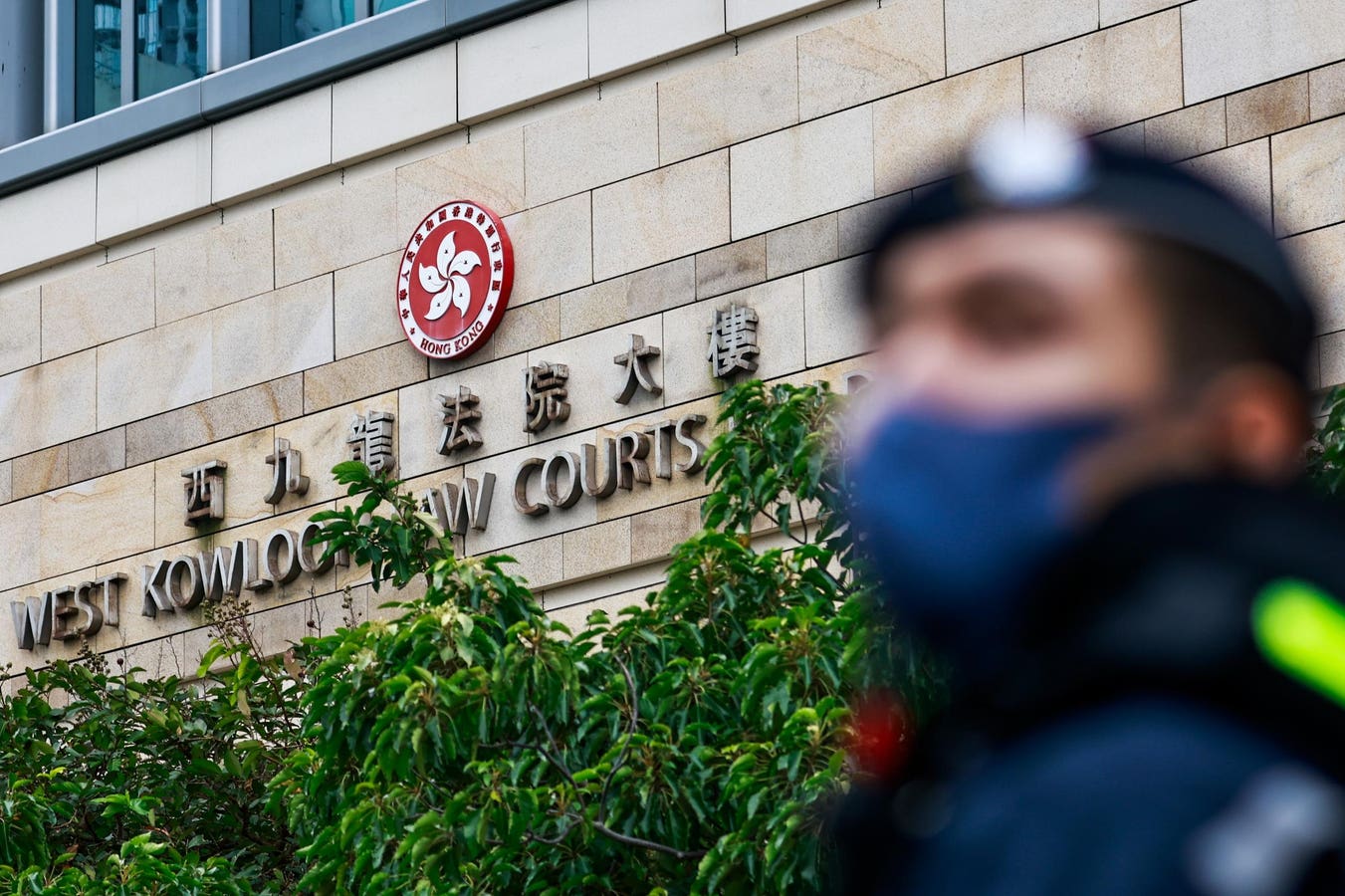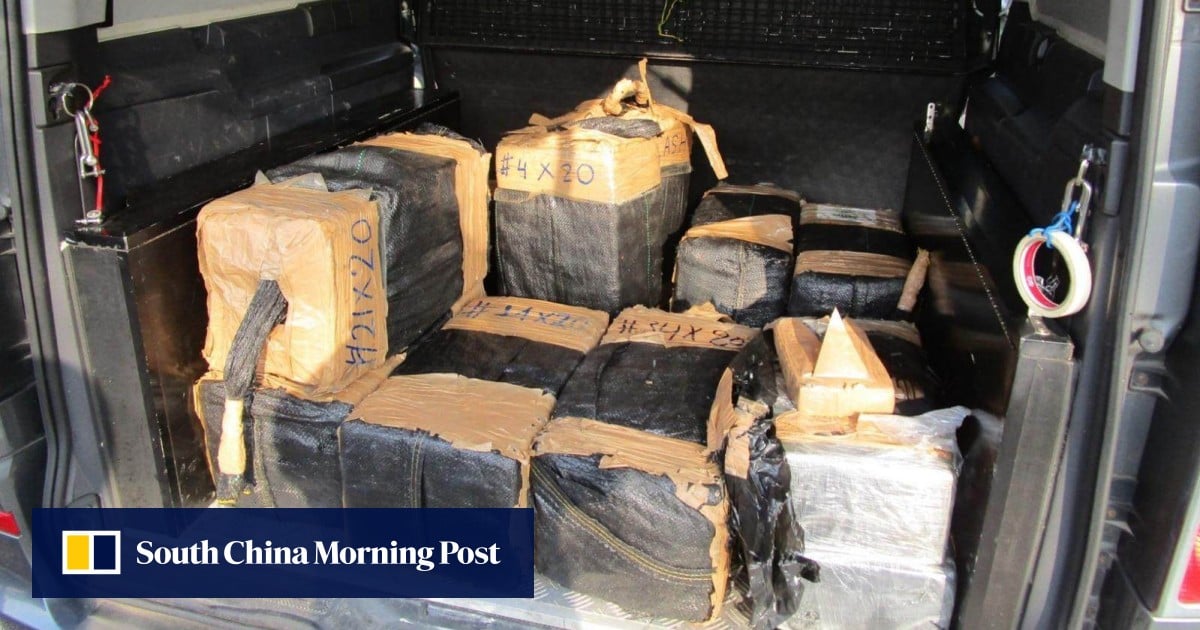Heavy police presence is seen on the sentencing day for the 45 pro-democracy activists convicted of … [+]
On November 19, 2024, 45 Hong Kong pro-democracy leaders were sentenced to years in jail for “subversion” following a controversial National Security Law (NSL) trial. Among them were Benny Tai, a former law professor at the University of Hong Kong, identified in the judgment as a mastermind of the plans, and Joshua Wong, a student leader of the 2014 umbrella movement and founder of a new political party Demosistō. Tai received 10 years, the longest sentence handed out under the NSL so far, and Wong – four years and eight months.
The group of human rights defenders, scholars, and lawmakers were charged with conspiracy to commit subversion for taking part in an unofficial primary to select opposition candidates in July 2020 (so-called Hong Kong 47). The trial of the Hong Kong 47 marked the largest single use of the controversial NSL, which China imposed on Hong Kong shortly after the pro-democracy protests in 2019. Most of the Hong Kong 47 were found guilty of conspiring to attempt subversion, one of four crimes the NSL established, while two were acquitted (the group is later referred to as Hong Kong 45). Now, all 45 were given sentences ranging from four to 10 years. Those who pleaded not guilty were given harsher sentences. Most of them have already spent more than three years in jail.
The trial and sentences received significant international outcry. Among others, the U.S. State Department condemned the sentences stating: “The 45 defendants sentenced today were aggressively prosecuted, and many now face life-altering imprisonment simply for their peaceful participation in political activities which are protected under the Basic Law of Hong Kong. (…) We call on Hong Kong authorities to immediately and unconditionally release these 45 individuals and similarly detained political prisoners. These harsh sentences erode confidence in Hong Kong’s judicial system and harm the city’s international reputation.”
Chris Patten, Hong Kong’s last British governor, commented: “The sentencing of 45 of the 47 Hong Kong democrats is not only an affront to the people of Hong Kong, but those who value rights and freedoms around the world. These brave individuals were an integral part of defining the pro-democracy movement in Hong Kong, and were peacefully supported by thousands through votes.”
The spokesperson for the United Nations Office of the High Commissioner for Human Rights (OHCHR) condemned the use of the NSL to criminalize activities which are protected under international human rights law, including freedom of expression, peaceful assembly, and association. Volker Türk, the High Commissioner for Human Rights, expressed concern over the broad and vague provisions which could be “arbitrarily applied to curb freedom of expression and target dissenting voices.”
The NSL has a profound effect on the right to a fair trial and the rule of law in Hong Kong. According to reports, more than 160 people have been arrested under the NSL since it was introduced in June 2020, including prominent pro-democracy figures like media entrepreneur Jimmy Lai, who faces life imprisonment if convicted under the law. The majority of them are human rights defenders, journalists and opposition politicians. Over 50 non-governmental organizations were forced to close since the enactment of the controversial law. These numbers will only increase. As the U.S. State Department stressed, “arrests and prosecutions appeared to be increasingly politically motivated.”
Those charged under the NSL are often denied bail or the threshold for bail is very higher. Bail conditions, adjudicated by specially designated national security judges, require the defendant to show that he or she would not continue to commit acts “endangering” national security. The defendants are often denied the right to a jury trial and face trial before a panel of three specially designated national security judges. The NSL establishes a separate procedure for investigation, prosecution and trial of those suspected under the NSL. Furthermore, those prosecuted under the NSL can be deprived of a public trial if there is a suggestion that national secrets may be revealed. Furthermore, as warned by the U.N. Special Rapporteur on Torture Alice Edwards in January 2024, there are reports of torture being used to extract evidence against defendants.
Despite these concerns, the NSL continues to be used widely and even expanded. Indeed, the March 2024 ordinance adds five additional categories of crimes, described as treason, insurrection, offenses in connection with state secrets and espionage, sabotage and endangering national security, and external interference. As commented by U.N. High Commissioner Volker Türk at the time, the broadly defined and vague provisions in the Bill could lead to the criminalization of a wide range of conduct protected under international human rights law, including the freedoms of expression and peaceful assembly, as well as the right to receive and impart information: “This ambiguity is deeply troubling, given its potential misuse and arbitrary application, including to target dissenting voices, journalists, researchers, civil society actors and human rights defenders. As we have already seen, such provisions readily lead to self-censorship and chilling of legitimate speech and conduct, in respect of matters of public interest on which open debate is vital.”
As the international outcry in relation to the controversial NSL continues, British citizen Jimmy Lai, 77, owner of the independent newspaper Apple Daily and pro-democracy and human rights defender, testifies in his NSL trial. He has been charged with two counts of conspiracy to commit foreign collusion and one count of publishing seditious material. If convicted, he faces life in prison.


